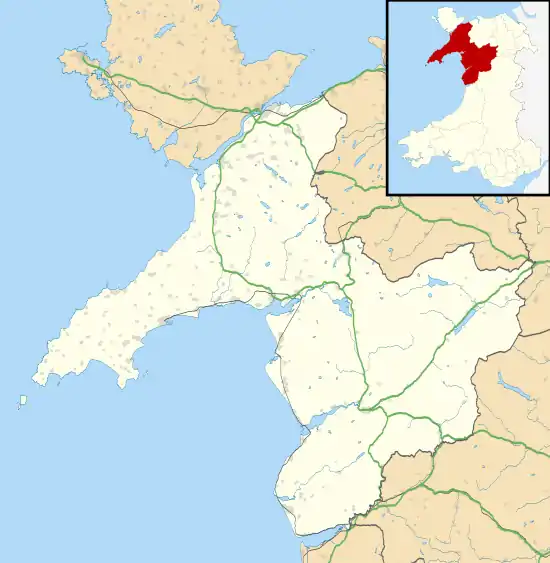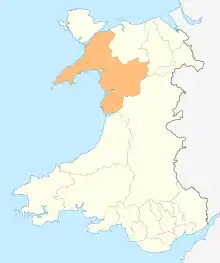Llandwrog
Llandwrog (![]() Welsh pronunciation; Welsh language: meaning 'The church of Saint Twrog') is a village and community in Gwynedd, north-west Wales, most notable for the presence of the headquarters of Welsh record label Sain and the site of Caernarfon Airport. It has a population of 2,466,[1] increasing to 2,539 at the 2011 Census.[2] The community includes the villages of Groeslon, Carmel, Gwynedd, Y Fron, Dinas Dinlle, and Cilgwyn.
Welsh pronunciation; Welsh language: meaning 'The church of Saint Twrog') is a village and community in Gwynedd, north-west Wales, most notable for the presence of the headquarters of Welsh record label Sain and the site of Caernarfon Airport. It has a population of 2,466,[1] increasing to 2,539 at the 2011 Census.[2] The community includes the villages of Groeslon, Carmel, Gwynedd, Y Fron, Dinas Dinlle, and Cilgwyn.
| Llandwrog | |
|---|---|
 Llandwrog village centre | |
 Llandwrog Location within Gwynedd | |
| Population | 2,539 (2011) |
| OS grid reference | SH450560 |
| Community |
|
| Principal area | |
| Country | Wales |
| Sovereign state | United Kingdom |
| Post town | CAERNARFON |
| Postcode district | LL54 |
| Dialling code | 01286 |
| Police | North Wales |
| Fire | North Wales |
| Ambulance | Welsh |
| UK Parliament | |
| Senedd Cymru – Welsh Parliament | |
As suggested by the village name, the parish church is dedicated St Twrog.[3]
It was the base of the first ever Sea and Mountain Rescue team, and includes the estate of Glynllifon.
RAF Llandwrog was a training airfield during World War II, and was later used as a weapons storage facility. It had a key role in Operation Sandcastle, where a large quantity of Nazi Tabun weapons were stored prior to eventual disposal at sea.
There is a local legend told about a midwife from Llandwrog. It is said that the she was once summoned by a stranger to an underground palace where she helped a queen give birth to a child. The stranger then gave the midwife some ointment for the baby's eyes. When the midwife accidentally touched it to her own eyes, the queen instantly changed into the midwife's former serving-maid, Eilian. Weeks later, when the midwife recognised the mysterious stranger at the local fair, she enquired about Eilian. The stranger replied that Eilian was well, and then asked the midwife which eye she saw him with. When she indicated the eye, he immediately poked it out.[4]
References
- Office for National Statistics : Census 2001 : Parish Headcounts : Gwynedd Archived 22 September 2010 at the Wayback Machine
- "Community population 2011". Retrieved 15 May 2015.
- Entry at the Church in Wales website.
- Ash, Russell (1973). Folklore, Myths and Legends of Britain. Reader's Digest Association Limited. pp. 392–393. ISBN 9780340165973.

